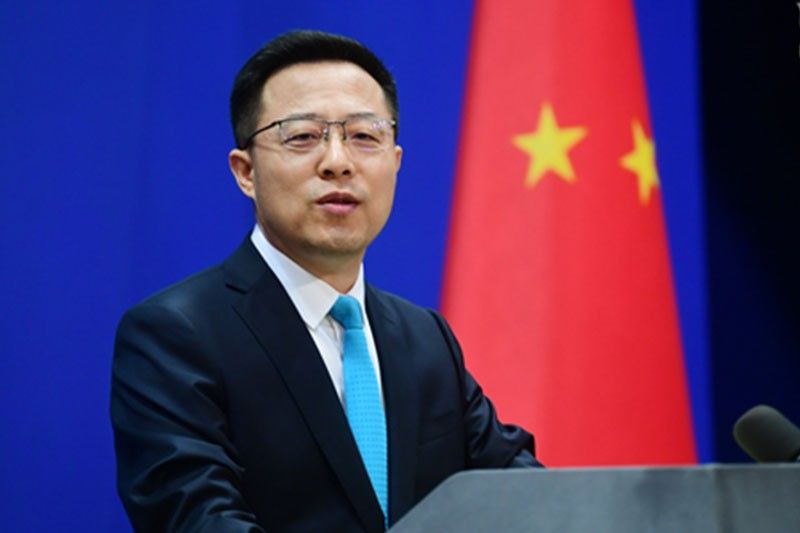'Waste paper': China still refuses to recognize 5-year-old arbitration award

MANILA, Philippines — Beijing remains firm on its position that award of the South China Sea arbitration issued five years ago was "illegal, null and void."
The landmark ruling of the United Nations-backed tribunal sided with the Philippines, invalidating its expansive claims in the South China Sea, including the West Philippine Sea.
Chinese foreign ministry spokesperson Zhao Lijian insisted that the July 2016 arbitral award violate the principle of state consent and is just a "piece of paper."
"The arbitration has major fallacies in fact-finding and application of law and violates UNCLOS and international law. The award of the arbitration is illegal, null and void. It is nothing more than a piece of waste paper," Zhao said in a press briefing on Monday.
Beijing reiterated that it does not accept nor participate in the arbitration and does not recognize the award.
"Anyone with a discerning eye can easily see that the arbitration is a political farce which is initiated and manipulated by the US to smear and suppress China," Zhao said.
Zhao also accused the United States of taking advantage of the fifth anniversary of the arbitral award by hyping up the South China Sea issue.
This statement came after US Secretary of State Antony Blinken accused China of continuing to "coerce and intimidate Southeast Asian coastal states."
"The US statement disregards the historical merits and objective facts of the South China Sea issue, violates and distorts international law, and breaks the US government's long-held public commitment of not taking a position on the South China Sea sovereignty issue," the Chinese foreign ministry spokesman said.
He added that Beijing is strongly dissatisfied with the "irresponsible" remarks from Washington.
"It deliberately stokes disputes on territorial sovereignty and maritime rights and interests, sows discord among regional countries and undermines regional peace and stability," Zhao said.
Blinken, on the other hand, reaffirmed the July 13, 2020 policy of the US on maritime claims in the South China Sea, including the West Philippine Sea.
The US top diplomat was referring to the declaration of his predecessor Mike Pompeo that Washington would treat Beijing's pursuit of resources in the contested waterway as illegal.
“We also reaffirm that an armed attack on Philippine armed forces, public vessels, or aircraft in the South China Sea would invoke US mutual defense commitments under Article IV of the 1951 US-Philippines Mutual Defense Treaty,” Blinken said.
Social media users, including former Solicitor General Florin Hilbay, are reporting seeing banners saying "Welcome to the Philippines, Province of China" hanging from overpasses in parts of Metro Manila.
The sightings coincide with the second anniversary of an arbitral tribunal ruling that China's sweeping nine-dash line claim over the South China Sea has no legal basis. The Philippines has opted to play down the ruling and focus on nurturing better political and economic relations with China.
NOT FUNNY.
— florin hilbay (@fthilbay) July 11, 2018
On this day, July 12, we commemorate our victory in Philippines v. China.
On Metro Manila footbridges, these tarps suddenly appear.
MMDA, LGUs, and citizens should immediately take these down. pic.twitter.com/gDR6BMbojI
It is unclear who put up the banners, which are a possible reference to a "joke" that President Rodrigo Duterte told Chinese-Filipino business leaders in February.
"He (Xi) is a man of honor. They can even make us 'Philippines, province of China," we will even avail of services for free," Duterte said in apparent jest. "If China were a woman, I'd woo her."
The Palace said the remark was meant to impress the audience, who were Filipino citizens of Chinese descent.
A week since the seventh anniversary of the historic ruling at The Hague, activist fisherfolk group urges the government to protest the presence of more than 50 Chinese Coast Guard vessels and one "monster ship" in the Ayungin Shoal (Second Thomas Shoal) before the international court.
It says that the swarming of the ships violates the United Nations Convention of the Law of the Sea.
“While the United Nations Convention on the Law of the Sea (UNCLOS) recognizes the freedom of navigation and innocent passage in open seas, a swarm of ships that creates tensions could be deemed illegal," Pambansang Lakas ng Kilusang Mamamalakaya ng Pilipinas (PAMALAKAYA) says.
"We urge the Marcos administration to protest and ultimately expel the overwhelming presence of Chinese Coast Guard vessels in our territorial waters. Their presence is a blatant display of military might to assert Beijing’s unjust claim in the West Philippine Sea. President Marcos could raise this recent swarming incident to the United Nations and reassert our sovereign rights upheld by the UNCLOS and other rules of international law," it adds.
A week before the seventh anniversary of the arbitral ruling on the South China Sea, fishers are seeking a stronger assertion of national sovereignty.
In a release, activist fisherfolk group Pambansang Lakas ng Kilusang Mamamalakaya ng Pilipinas (PAMALAKAYA) urges the Marcos administration to “have a stronger action to assert our sovereign rights to China using the arbitral award.”
It stressed that it has been seven years since the Philippines won in the Permanent Court of Arbitration but the Chinese military facilities on seven artificial islands on the Spratlys island remain. It also cited more than 200 Chinese vessels and boats are still regularly patrolling in our territory.
PAMALAKAYA chair Fernando Hicap says President Marcos Jr. should be alarmed over the long-term impact of these actions in the fish production in the country and demanded swift action to protect Filipino fishermen from aggression.
Days after the anniversary of the historic 2016 Hague ruling, China insists the 2016 Hague ruling is "illegal, null and void."
Chinese Foreign Ministry Spokesperson Wang Wenbin says: "The so-called award of the South China Sea arbitration seriously violates international law including the UNCLOS."
The ruling invalidates China's nine-dash claims over the South China Sea. However, Wang says: "China neither accepts nor recognizes it and will never accept any claim or action based on the award." — Kaycee Valmonte
The United States reaffirms its commitment to the Philippines on the sixth anniversary of the Hague tribunal ruling.
Secretary of State Antony Blinken says it also reaffirms “that an armed attack on Philippine armed forces, public vessels, or aircraft in the South China sea would invoke U.S. mutual defense commitments under Article IV of the 1951 U.S.-Philippines Mutual Defense Treaty.”
Blinken tthen calls on the People’s Republic of China to “abide by its obligations under international law and cease its provocative behavior.”
“We will continue to work with allies and partners, as well as regional institutions like ASEAN, to protect and preserve the rules-based order.” — Kristine Joy Patag with Kaycee Valmonte
The United States reaffirms its commitment to the Philippines on the sixth anniversary of the Hague tribunal ruling.
— Kaycee Valmonte (@kayceevalmonte) July 12, 2022
The US also calls on China to abide by obligations under international law and "cease its provocative behavior" @PhilstarNews pic.twitter.com/mPLRwBGiQU
Foreign Affairs Secretary Enrique Manalo says July 12, 2016 is remembered as “the day the that affirmed to the community of nations that the rule of law prevails, and that stability, peace and progress can only be attained on a rules-based legal order on the oceans, as it should be everywhere else.”
He adds the award “not only sets reason and right in the South China Sea, but is an inspiration for how matters should be considered—through reason and right—by states facing similarly challenging circumstances.”
Manalo stresses that the findings are conclusive and indisputable, and the award is final.
“We firmly reject attempts to undermine it; nay, even erase it from law, history, and our collective memories. At the same time we welcome the support of a growing list of countries for the Award.” — Kristine Joy Patag
- Latest
- Trending



































